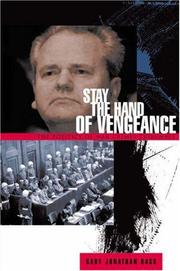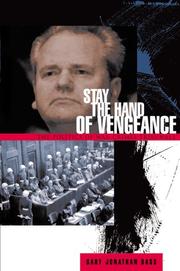| Listing 1 - 7 of 7 |
Sort by
|

ISBN: 069104922X 1400851718 0691092788 1306799716 Year: 2000 Publisher: Princeton (N.J.) : Princeton university press,
Abstract | Keywords | Export | Availability | Bookmark
 Loading...
Loading...Choose an application
- Reference Manager
- EndNote
- RefWorks (Direct export to RefWorks)
"International justice has become a crucial part of the ongoing political debates about the future of shattered societies like Bosnia, Kosovo, Rwanda, Cambodia, and Chile. Why do our governments sometimes display such striking idealism in the face of war crimes and atrocities abroad, and at other times cynically abandon the pursuit of international justice altogether? Why today does justice seem so slow to come for war crimes victims in the Balkans? In this book, Gary Bass offers an unprecedented look at the politics behind international war crimes tribunals, combining analysis with investigative reporting and a broad historical perspective. The Nuremberg trials powerfully demonstrated how effective war crimes tribunals can be. But there have been many other important tribunals that have not been as successful, and which have been largely left out of today's debates about international justice. This timely book brings them in, using primary documents to examine the aftermath of the Napoleonic Wars, World War I, the Armenian genocide, World War II, and the recent wars in the former Yugoslavia. Bass explains that bringing war criminals to justice can be a military ordeal, a source of endless legal frustration, as well as a diplomatic nightmare. The book takes readers behind the scenes to see vividly how leaders like David Lloyd George, Winston Churchill, Franklin Roosevelt, and Bill Clinton have wrestled with these agonizing moral dilemmas. The book asks how law and international politics interact, and how power can be made to serve the cause of justice. Bass brings new archival research to bear on such events as the prosecution of the Armenian genocide, presenting surprising episodes that add to the historical record. His sections on the former Yugoslavia tell--with important new discoveries--the secret story of the politicking behind the prosecution of war crimes in Bosnia, drawing on interviews with senior White House officials, key diplomats, and chief prosecutors at the war crimes tribunal for the former Yugoslavia. Bass concludes that despite the obstacles, legalistic justice for war criminals is nonetheless worth pursuing. His arguments will interest anyone concerned about human rights and the pursuit of idealism in international politics."
Law of armed conflicts. Humanitarian law --- International criminal courts. --- War crime trials. --- Law and politics. --- Tribunaux criminels internationaux --- Procès (Crimes de guerre) --- Droit et politique --- Law --- Political aspects. --- War crime trials.Political aspects. --- Procès (Crimes de guerre) --- Criminal courts --- International courts --- Complementarity (International law) --- Trials (War crimes) --- Trials (Crimes against humanity) --- Trials (Genocide) --- Trials --- Law and politics --- VIE INTERNATIONALE --- REGLES INTERNATIONALES --- JURIDICTIONS INTERNATIONALES --- DROIT HUMANITAIRE
Book
ISBN: 9780307700209 Year: 2013 Publisher: New York (N.Y.) Knopf
Abstract | Keywords | Export | Availability | Bookmark
 Loading...
Loading...Choose an application
- Reference Manager
- EndNote
- RefWorks (Direct export to RefWorks)
BANGLADESH -- 930.3 --- ATROCITIES -- 930.3 --- GENOCIDE -- 930.3 --- NIXON, RICHARD -- 930.3 --- KISSINGER, HENRY -- 930.3 --- SOUTH ASIA -- 930.3 --- USA -- 930.3
Book
ISBN: 9780307744623 9780385350471 Year: 2014 Publisher: New York, N.Y. Vintage Books, a division of Random House LLC
Abstract | Keywords | Export | Availability | Bookmark
 Loading...
Loading...Choose an application
- Reference Manager
- EndNote
- RefWorks (Direct export to RefWorks)
International relations. Foreign policy --- Nixon, Richard --- Kissinger, Henry --- Asia

ISBN: 0691092788 Year: 2001 Publisher: Princeton (N.J.) Princeton university press
Abstract | Keywords | Export | Availability | Bookmark
 Loading...
Loading...Choose an application
- Reference Manager
- EndNote
- RefWorks (Direct export to RefWorks)
Book
ISBN: 9781400851713 Year: 2014 Publisher: Princeton, NJ
Abstract | Keywords | Export | Availability | Bookmark
 Loading...
Loading...Choose an application
- Reference Manager
- EndNote
- RefWorks (Direct export to RefWorks)
Book
ISBN: 9781101947104 1101947101 Year: 2023 Publisher: New York Alfred A. Knopf
Abstract | Keywords | Export | Availability | Bookmark
 Loading...
Loading...Choose an application
- Reference Manager
- EndNote
- RefWorks (Direct export to RefWorks)
"In the weeks after Japan finally surrendered to the Allies, the world turned to the question of how to move on from years of carnage and destruction. For Harry Truman, Douglas MacArthur, and their fellow victors, the questions of justice seemed clear: Japan's leaders needed to be tried and punished for the surprise attack at Pearl Harbor; war crimes against citizens in China, the Philippines, Korea, and elsewhere; and rampant abuses of POWs. For the Allied Forces, the trial was an opportunity to achieve justice against the defendants, but also to create a legal framework for the prosecution of war crimes and to prohibit the use of aggressive war, and to create the kind of liberal international order that would prevail in Europe. For the Japanese leaders facing trial, it was their chance to argue that their war had been waged to liberate Asia from Western imperialism. For more than two years, lawyers for both sides presented their cases before a panel of judges from China, India, the Philippines, and Australia, as well as the US and Europe. The testimony ran from horrific accounts of brutality and the secret plans to attack Pearl Harbor to the Japanese military's threats to destabilize the government if it sued for peace. Yet rather than clarity and unanimity, the trial brought division and complexity; these tensions and contradictions could also be seen playing out across Asia as the trial unfolded, from China's descent into civil war to India's independence and partition to Japan's first successful democratic elections and the rewriting of a new, liberal constitution" --
Tokyo Trial, Tokyo, Japan, 1946-1948 --- War crime trials --- World War, 1939-1945 --- History --- Campaigns --- Atrocities --- International Military Tribunal for the Far East.

ISBN: 9781400851713 9780691092782 Year: 2014 Publisher: Princeton, N.J. Princeton University Press
Abstract | Keywords | Export | Availability | Bookmark
 Loading...
Loading...Choose an application
- Reference Manager
- EndNote
- RefWorks (Direct export to RefWorks)
| Listing 1 - 7 of 7 |
Sort by
|

 Search
Search Feedback
Feedback About UniCat
About UniCat  Help
Help News
News